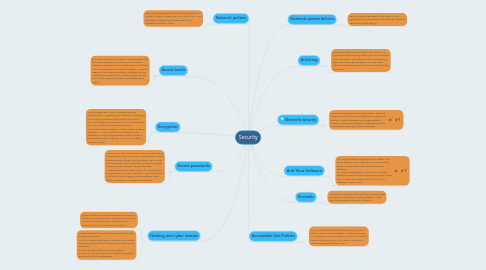Security
作者:Nombre y apellido

1. Secure passwords
1.1. When more than one person uses a network it is important to have user IDs and passwords. Only someone with a login and password can access that network. It also helps the network manager trace unusual activity to a specific user. A weak password makes it easy for someone to try to guess your login details. A good password will have a mix of upper case and lower case letters, numbers and special characters.
2. Access levels
2.1. In a large company or school, many people will be using computers on the same network. A network manager will normally control the level of access people have to the network. General users will not have the ability to download any software they want or to make changes to any part of the system, as that could affect other users.
3. Encryption
3.1. Any message sent over a network can be intercepted. Encryption is a method of changing the original numbers and characters so that they are hidden or disguised. This is important if you are sending sensitive information. One method of encryption is the Caesar Cipher algorithm. In this method, each letter of the alphabet is simply replaced by another letter in the alphabet that might be one or more letter positions away.
4. Network policies
4.1. Network policies provide rules and guidelines on what network users can and cannot do. Most networks in large organisations will have network policies in place.
5. Hacking and cyber attacks
5.1. Cyber attacks and cyber terrorism are ways of attacking companies and organisations online. There are frequent cyber attacks on the government and businesses in the UK.
5.2. Hackers attempt to break into networks to steal private information. In 2011, Sony’s PlayStation Network was hacked and security details for thousands of users were released. IT security specialists are employed by companies to hack their own networks and find security faults or weaknesses.
6. Network security
6.1. Anyone sharing personal information, eg bank details, wants to be sure that they are safe and secure. Most businesses and organisations employ network managers or administrators to manage the security of their networks.
7. Anti-Virus Software
7.1. Anti-virus software is designed to detect and block attacks from malware. Some operating systems have their own inbuilt anti-virus software. In a large organisation, a network manager should make sure that all the computers under their control are secure and the anti-virus software is up to date.
8. Firewalls
8.1. A firewall is software that will block unexpected connections coming in to the network. Most operating systems include a firewall.
9. Acceptable Use Policies
9.1. An AUP states how the network may be used – what is and is not acceptable. If you are going to let people use your network, then you should have an agreement in place which states the rules and guidelines for users.
10. Archiving
10.1. Networks often have to store a lot of data. A good archiving strategy takes old, non-essential data and puts it somewhere safe. An archiving policy will help decide when to move data, where it should be kept, and how to get it back if needed.
11. Network system failures
11.1. Security measures need to be high on the agenda for any company that uses and relies on networking technology.


